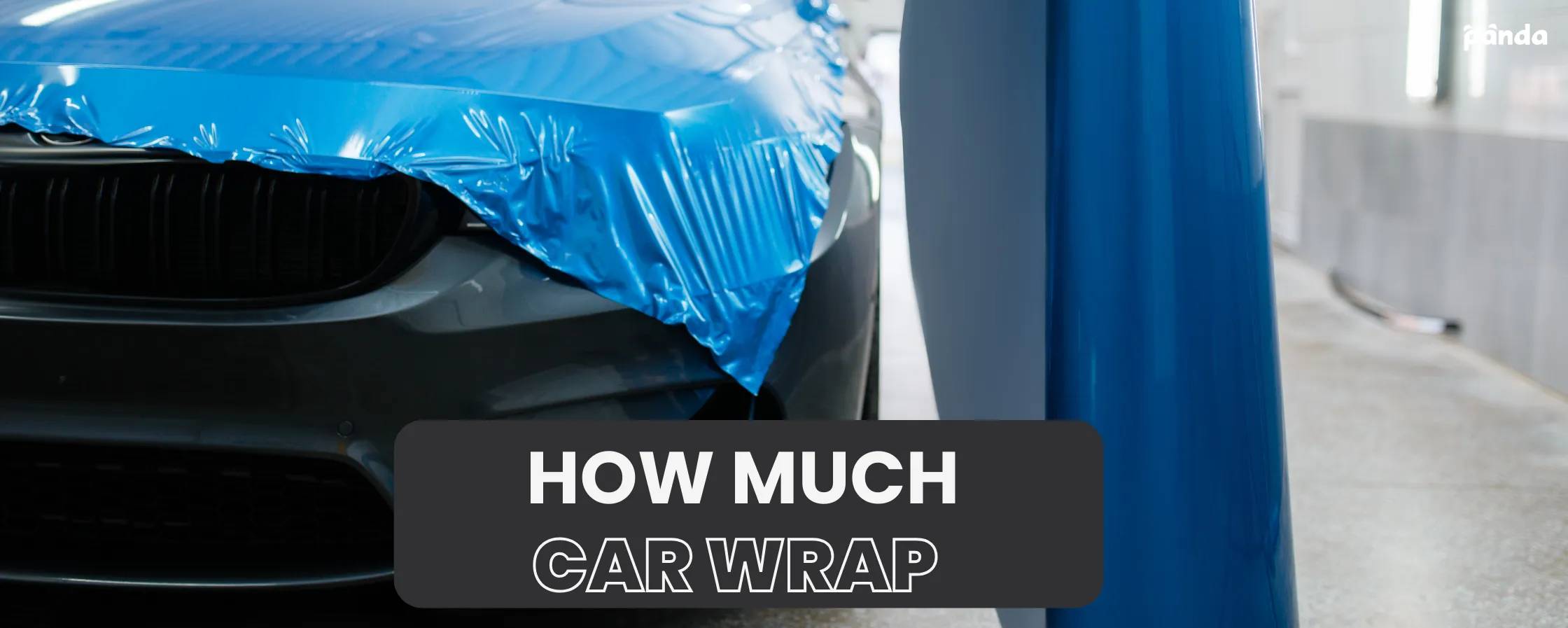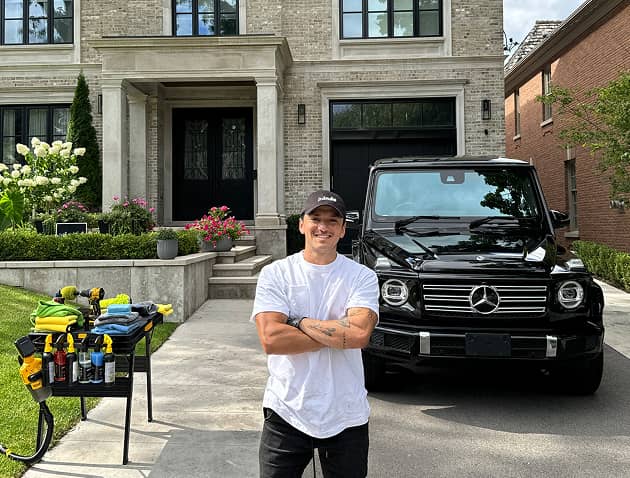How Much Does it Cost to Wrap a Car in 2025 | Complete Guide to Car Wrap Cost
This blog post aims to unwrap the layers of car wrapping costs, exploring the factors that influence pricing and what you can expect to pay for a professional wrap.

Written by:
Parham Koukia
Reviewed By:
Editorial Team
Published: August 25, 2025
Updated: October 06, 2025
Use AI to summarize this article:
Car wrapping is the process of covering the exterior of a vehicle with a thin, adhesive vinyl film.
This film comes in a wide range of colors and finishes, allowing for a high degree of customization.
From glossy and matte finishes to metallic and textured options, you’ll have multiple options to wrap your car.
This article discusses the cost of wrapping a car in 2025, along with the factors affecting the wrap cost.
Average Car Wrap Cost in 2025
While the average cost to wrap a car in 2025 ranges from $2,000 to $10,000, it also depends on factors like the vehicle’s size, vinyl quality, and finish. Premium wraps, like chrome or color-shift, can exceed $10,000 for luxury vehicles.
Typical Price Range by Vehicle Type
| Vehicle Type | Full Wrap Cost Estimate |
|---|---|
| Compact Car | $2,000-$3,500 |
| Sedan | $3,000-$4,500 |
| SUV | $4,000-$6,500 |
| Truck | $4,500-$7,000 |
| Luxury Vehicle | $5,500-$10,000+ |
Wrap Cost by Vinyl Finish
| Finish Type | Estimated Cost Range |
|---|---|
| Gloss | $2,000-$5,000 |
| Matte | $2,500-$6,000 |
| Satin | $2,800-$6,500 |
| Chrome | $6,000-$9,000+ |
| Color-Shift | $5,000-$8,000+ |
Price Comparison: Full Wrap vs Partial Wrap
- Full wraps cover the entire exterior of the car, offering complete color transformation and paint protection.
- Partial wraps may only include the hood, roof, trunk, or side panels, costing between $500 and $2,500.
What Affects the Cost of a Car Wrap?
Size and Shape of the Vehicle
Larger vehicles like SUVs and trucks require more vinyl and labor. Complex contours or body kits add to installation time and cost.
Type and Quality of Vinyl Used
Brands like 3M and Avery Dennison offer high-quality vinyl films in multiple finishes. 3M's patented adhesive and durability often push it into the higher price bracket, while Avery is known for ease of application and lower cost.
Design Complexity and Labor Charges
Custom designs, branding wraps, or detailed graphic installs require more time. Labour charges vary based on location and installer expertise, often ranging from $1,000 to $3,000.
Region-Specific Pricing Insights
In cities with higher labor costs, like Los Angeles or Toronto, car wraps cost more than in smaller markets. Climate also plays a role in the cost of car wrapping as wraps in hot, humid regions require more care and maintenance, affecting lifespan.
Types of Car Wraps and Their Cost Breakdown
Full Wraps: Color Change, Paint Replacement
Full wraps replace the visible paint with vinyl film. They’re ideal for aesthetic upgrades and protecting OEM paint from environmental damage.
Partial Wraps: Accent Panels, Roof, Hood
Best for budget-conscious customization. Popular options include racing stripes, carbon fiber hoods, or blacked-out roofs.
Chrome, Matte, Gloss, Satin, and Color-Shift Wraps
These finishes don’t just alter color but also create texture and light-reflective effects. Chrome and color-shift films are particularly labor-intensive to apply and remove.
Paint Protection Film (PPF) vs Colored Wraps
PPF is typically clear and applied to vulnerable areas (e.g., front bumper, hood). New colored PPFs offer color plus protection, but cost more, ranging from $4,000 to $8,000+, depending on coverage.
Is It Cheaper to Wrap a Car or Paint It?
Cost Comparison: Wrap vs Paint Over 5 Years
| Service Type | Initial Cost | Lifespan | Cost Over Time |
|---|---|---|---|
| Vinyl Wrap | $3,500 avg | 5 years | $700/year |
| Paint Job | $5,000 avg | 10 years | $500/year |
Wraps are more affordable upfront and ideal for short-term customization, whereas paint lasts longer but requires more time and permanent commitment.
Time, Prep, and Downtime: Which is More Efficient?
- Wraps can be completed in 2-5 days.
- Paint requires sanding, curing, and refinishing, often taking up to two weeks.
Real-World Example Scenarios: Budget vs Luxury Cars
- Wrapping a Honda Civic in matte black: ~$2,800
- Painting the same car: ~$3,800
- Wrapping a Porsche 911 in chrome: ~$9,000+
- Painting with the same visual effect: ~$12,000+
How Long Does a Car Wrap Last?
Lifespan by Vinyl Type and Finish
| Finish Type | Average Lifespan |
|---|---|
| Gloss | 4-6 years |
| Matte | 3-5 years |
| Satin | 4-6 years |
| Chrome | 2-4 years |
| Color-Shift | 3-5 years |
Factors That Shorten or Extend Lifespan
- UV exposure (garage vs outdoor)
- Regular washing (use pH-neutral soap)
- Avoiding harsh chemicals and automatic brushes
Maintenance Tips to Keep Your Wrap Looking New
- Hand wash every two weeks using soft microfiber mitts
- Remove bug guts, bird droppings, and tree sap promptly
- Apply ceramic coating designed for vinyl if desired
DIY vs Professional Wrap: Cost, Risk, and Quality
What You Need for a DIY Car Wrap
You’ll need: surface cleaner, squeegee, heat gun, vinyl cutter, gloves, masking tape, and 250+ square feet of vinyl.
DIY Material and Tool Cost Estimate
| Item | Approximate Cost |
|---|---|
| Vinyl (3M, 250 sq ft) | $700-$900 |
| Tools & Supplies | $100-$300 |
| Total | $800-$1,200 |
When to Leave It to Professionals
DIY is viable only if you have prior experience. Otherwise, mistakes can cost more in reapplication or paint damage. A qualified installer guarantees a better finish, adhesion, and longevity.
Common Questions About Car Wrap Cost
Can a Wrap Damage My Car’s Paint?
No, if applied and removed correctly car wrap won’t damage your car's exterior. In fact, it protects the original paint.
However, wrapping over chipped or rusted areas may worsen the damage during removal.
What’s the Cheapest Vinyl Wrap That Lasts?
Avery’s entry-level wraps or VViViD’s consumer-grade vinyls cost less than $2,000 but require careful installation. Budget vinyls often fade faster.
How Much Does It Cost to Remove a Wrap?
Wrap removal can cost $500-$800, assuming the vinyl is still intact.
If baked in by the sun or poorly applied, the car wrap removal cost can go over $2,000.
Do Tesla or Other Automakers Offer OEM Wraps?
Yes. Tesla now offers factory wrap options for select models like the Model 3, Y, and Cybertruck.
Pricing of wrapping a Tesla ranges from $5,700 to $6,500, using urethane film with self-healing properties.
Final Thoughts: Is a Car Wrap Worth the Investment?
Business Advertising Value
Commercial wraps turn your car into a mobile billboard. For local service businesses one-time investment can deliver years of brand visibility.
Aesthetic and Paint Protection Benefits
From color changes to paint protection, vinyl wraps offer flexibility.
They prevent minor scratches and protect your factory finish.
When a Wrap Makes the Most Sense
- You want to switch your car’s look every few years
- Your car’s OEM paint is in excellent condition
- You need branding for business fleets
We hope this guide has helped you to make the right choice for your vehicle and budget. Whether you’re going for bold chrome, subtle satin, or practical PPF, there’s a wrap for every driver and every goal!
Panda Hub doesn't offer car wrapping services, but for any professional detailing services, this is your go to platform!

Parham Koukia
Lead Car Detailer / Operations Manager
With nearly 15 years of hands-on detailing experience, Parham has become a trusted authority in the auto care world. His work is regularly spotlighted in leading outlets like CNN, GoBankingRates, and Family Handyman. Parham likes to share his knowledge to offer in-depth tips on equipment selections, seasonal car care, and some secret car cleaning tips used by detailers in the real world!
Read more
